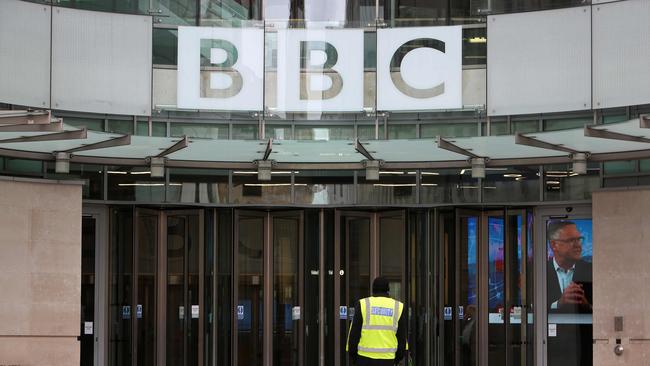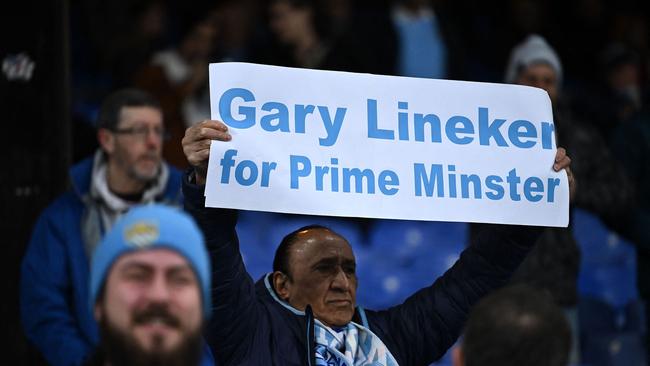‘It’s a farce’: how Gary Lineker kicked off 24 hours of anarchy at BBC
With leadership conspicuously absent and staff divided and on strike, corporation life resembles satire. As one critic points out: ‘No one can mishandle a crisis quite like the BBC.’
As the BBC collapsed into crisis after suspending Gary Lineker, one staffer said the situation had become “so farcical” that it wouldn’t have been believable as a plot line in the mockumentary about the corporation, W1A. “The writers wouldn’t have dared do this – it’s too insane and incompetent,” he said.
Tim Davie, the director-general, had hoped his decision on Friday would draw a line under the criticism of Lineker’s tweets about asylum seekers; instead it unleashed 24 hours of chaos that wreaked havoc on its sports coverage, culminating in Match of the Day being cut to 20 minutes. As presenters and pundits pulled out of their shows in solidarity with the former footballer, one source dubbed it an “I’m Sportacus!” moment.
Inside the BBC, the condemnation of Davie’s handling of Lineker was fierce: “No one can mishandle a crisis quite like the BBC,” said a critic. Staff hopes for a swift resolution so that it did not affect Sunday’s programming – including Match of the Day 2 – were dashed. It didn’t help that the two main players were on opposite sides of the Atlantic: Davie is in Washington visiting the BBC’s offices, while Lineker had headed to Leicester to watch his team play. “This is a terrible day for the BBC,” said one correspondent. “BBC Sport and Match of the Day are the jewels in its crown. There could be a risk of losing Premier League rights if this isn’t sorted quickly.”
The situation had been triggered by Lineker criticising the government’s bill on illegal immigration, which he tweeted on Tuesday was “beyond awful” and deployed “language that is not dissimilar to that used by Germany in the 30s”. On Friday, after he had refused to issue a public apology for his comments, the BBC announced that Lineker had “stepped back” but it was swiftly revealed that this was not his choice: he had been pulled off air.
This decision was led by Davie, who said on Friday that as “editor in chief of the BBC, I think one of our founding principles is impartiality and that’s what I’m delivering on”. Some BBC board members expect to receive “updates” on the Lineker situation on Monday. Eyebrows will be raised by the fact that the board is chaired by Richard Sharp, a Conservative donor who before he was appointed helped to arrange an £800,000 ($1.46m) loan for Boris Johnson.
There was speculation that the BBC’s director of sport, Barbara Slater, was opposed to suspending Lineker, but sources close to Davie denied this. Staff were critical of her slow response to the crisis. “There’s a complete absence of leadership,” said a BBC sports journalist. “The staff are very unhappy and feel extremely unsettled.” Another added: “This is Armageddon – essentially an entire division of the BBC has gone on strike.” Slater emailed staff apologising for the situation, and the BBC has told staff that it will be holding sessions on Monday so that they can “have their say”.

They have had a torrid weekend. After Lineker was taken off air, producers scrabbled around to find a replacement, with Mark Chapman among those asked. No one would step in, fearing that they would be seen as a “scab”. A source said: “If they weren’t wise enough to say no, their agents were.” Ian Wright, a regular studio pundit who should have been in the studio on Saturday, tweeted that he would not be appearing in “solidarity”. Alan Shearer promptly followed. Match of the Day’s commentators, who had formed a WhatsApp Group, then pulled out. It emerged that the BBC did not have rights to use the commentaries supplied by Premier League Productions, leading to fears that it would have to broadcast Match of the Day in silence.
The contagion spread. The former footballers Alex Scott and Kelly Somers pulled out of the lunchtime magazine show Football Focus, as did Match of the Day’s Micah Richards. The schedule fell apart, with BBC1’s Football Focus and Final Score replaced by repeats of Bargain Hunt and The Repair Shop, while on Radio 5 Live podcasts were broadcast instead of sports programs such as the comedy panel show Fighting Talk.
The unhappiness was broader than sport, though. Leaked posts on the BBC’s Slack messenger system showed news staff were mutinous. One dubbed it “disgraceful cowardice from leadership”, another said “I’m starting to think there is little point in working here anymore”, and a third said “Richard Sharp – all good; Gary Lineker calling out racism and fascism – outrage.” A fourth asked: “Who has more integrity, a banana republic or the BBC?” A radio presenter put this in a wider context: “What you are watching is the pent-up anger of an entire organisation, channelling through this incident.” It is already a spring of discontent at the BBC: on Wednesday, staff will walk out over cuts to local radio, in a strike coinciding with the spring budget.
Lineker, 62, had felt that Sharp’s behaviour would make it impossible for the corporation to criticise staff’s social media activity. Emily Maitlis, the former Newsnight presenter who now hosts The News Agents podcast, said the pair had spoken a couple of weeks ago, with Lineker saying: “They are going to find these conversations with us a lot harder now.”
Among BBC journalists, there is a split in attitudes. To some, it is obvious that the impartiality rules are aimed at those covering news and current affairs, not sports presenters. Others think it unfair that the BBC’s highest paid presenter, who earned £1.35m ($2.5m) at the corporation last year, has been given so much leeway when “junior staff on £25,000 ($46,000) receive a phone call from their manager if they even slightly overstep the mark”.
The strangest part of this crisis is that by Friday morning, there was a feeling among many BBC staff that it was blowing over. Two solutions were being whispered about: either that the BBC should quietly change its social media guidelines in the summer to reflect the distinction between sports and news journalists, or that Lineker and the BBC could part amicably after the FA Cup final in June.
“It seemed like we were past the point of maximum danger,” said one insider. “This was a story based on a couple of tweets – it was naturally running out of steam.” Lineker had himself tweeted on Thursday afternoon that the “ridiculously out of proportion story seems to be abating” and that he was looking forward to presenting Match of the Day. Many in the BBC feel Davie, who is not a former journalist but a marketing man, should have recognised this. “This is the problem of him not understanding the news cycle,” said one. “He’s also shown that he can be manipulated by the Daily Mail.”
Internally, the common complaint earlier in the week was that the story had led the BBC News at Ten on Wednesday night. “That horrified people,” said a senior journalist. “They told the nation that this was the most important story on a day when the conversation should have been about the government’s immigration policy.” The next day, he added, the regular 9am editors’ meeting was peppered with dissent about the decision. Paul Royall, the editor of BBC News at One, Six and Ten, has been seconded to work on the merger of the news channel and its global counterpart, and some felt he would have ordered the stories differently.
When Davie took over as director-general in September 2020, he said he wished to appeal to “BBC bloke”, who he felt was underserved by the broadcaster since it had lost so much football and Formula One. Yet, noted one staffer, “it’s hard to imagine anything that would be less popular with that type of viewer than setting fire to our sports coverage”.
Oddly, these “BBC blokes” include Davie himself. In his first appearance before the digital, culture, media and sport committee as director-general, he stated that he was a “religious fan of Match of the Day and … on an intravenous drip of numerous football commentaries”. Davie, 55, also justified Lineker’s salary, describing him as “one of those outstanding talents”.
However, sources at the broadcaster said that Davie had long viewed BBC Sport as a problem on impartiality grounds, in large part thanks to presenters such as Lineker. In October 2020 Davie set out new guidelines for staff, stating that they should avoid expressing their personal views on issues of political controversy. The BBC’s social media guidelines state: “Where individuals identify themselves as being linked with the BBC, or are program makers, editorial staff, reporters or presenters primarily associated with the BBC, their activities on social media have the potential to compromise the BBC’s impartiality and to damage its reputation.” However, it also notes: “The risk is lower where an individual is expressing views publicly on an unrelated area, for example, a sports or science presenter expressing views on politics or the arts.”

Roger Mosey, a former head of BBC TV News who is now the master of Selwyn College, Cambridge, argued that while Lineker’s tweets were not compliant with its editorial guidelines, the corporation had been inconsistent in applying them over the years, adding: “Their statement about not wanting Lineker to be ‘an opinion-free zone’ is an example of murkiness. The corporation also hasn’t explained why Lineker is restrained but Alan Sugar and co seem not to be.”
“I expect the BBC will have to set up a review of its impartiality guidelines,” said a former BBC journalist. “This might help settle this dispute, if it’s an independent review by a trusted figure. Otherwise, I can only see Lineker leaving.”
The treatment of Lineker will also fuel a view that the BBC is sliding to the right. One staffer has created a “Right Wing Watch” WhatsApp group that is keeping track of comments by executives such as Sharp, Davie, who stood unsuccessfully as a Tory councillor, John McAndrew, who rejoined the BBC as director of news programs after helping launch GB News, and the board member Sir Robbie Gibb, who worked for Theresa May in Downing Street. On Slack, one described the BBC board as “active Tory agents”.
This latest crisis has meant that the miserable mood in the BBC newsroom has infected sport too. As one BBC staffer noted: “[I’m] looking forward to the next BBC staff survey.”
The Times




To join the conversation, please log in. Don't have an account? Register
Join the conversation, you are commenting as Logout